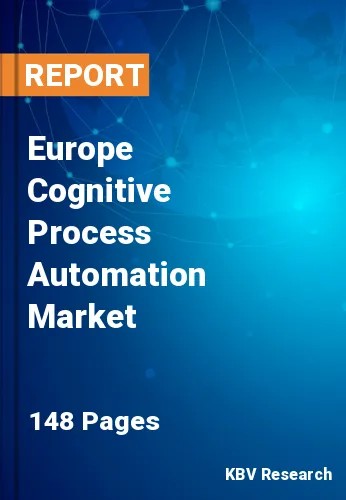The Europe Cognitive Process Automation Market would witness market growth of 24.4% CAGR during the forecast period (2023-2030).
Implementing automation technologies is spreading across various sectors, including BFSI, IT & telecom, healthcare, and others, thereby fueling market expansion. Additionally, adopting this technology in sectors to enhance the traditional performance of their processes through knowledge-based workflows stimulates market expansion. Enterprises can automate labor-intensive operations with cognitive automation to increase productivity, prevent human error, and save costs.
Cognitive automation can take several forms, like utilizing automated procedures with intelligent data collecting, such as optical character recognition (OCR), machine vision, natural language processing, or natural language understanding. This is frequently referred to as IPA or DPA. Automating configuration and decisions using AI decision algorithms to enhance or replace current business rules monitoring systems or enterprise resource planning systems. These self-driving corporate solutions essentially introduce self-driving capabilities to enterprise solutions.
Cognitive process automation can be used in a variety of application situations. One example is to combine RPA and cognitive capabilities for chatbots that give customers the impression that they are instant messaging with a human customer service person. Another option is to develop voice-activated bots for telephone conversations.
Due to the fact that Europe is a capital-intensive region, the demand for automation has expanded in a variety of industries, including the pharmaceutical industry. With increasing research & development activities in the medical and pharmaceutical industries and the development of technologies such as machine learning (ML), artificial intelligence (AI), and automation algorithms, the European healthcare & life science automation industry is expected to expand at a rapid pace. In addition, as a result of government- sponsored investment programs for the life science business, it is anticipated that the future of this sector will embrace the latest technology changes, such as pharmacy automation.
The Germany market dominated the Europe Cognitive Process Automation Market by Country in 2022, and would continue to be a dominant market till 2030; thereby, achieving a market value of $1.8 billion by 2030. The UK market is estimated to witness a CAGR of 23.3% during (2023 - 2030). Additionally, The France market would showcase a CAGR of 25.3% during (2023 - 2030).
Based on Application, the market is segmented into Machine Learning, Pattern Identification, Biometrics, Natural Language Processing, and Optical Character Recognition & Others. Based on Vertical, the market is segmented into BFSI, Manufacturing, IT & Telecommunication, Retail & E-commerce, Transportation & Logistics, Media & Entertainment, Healthcare & Life Sciences, Energy & Utilities, and Others. Based on Services, the market is segmented into Finance, Procurement, HR, and IT Operations. Based on Type, the market is segmented into Intelligent Process Automation, and Robotic Process Automation. Based on countries, the market is segmented into Germany, UK, France, Russia, Spain, Italy, and Rest of Europe.
Free Valuable Insights: The Worldwide Cognitive Process Automation Market is Projected to reach USD 26.9 Billion by 2030, at a CAGR of 24.9%
The market research report covers the analysis of key stake holders of the market. Key companies profiled in the report include Altair Engineering, Inc. (IMG COMPANIES, LLC.), Alteryx, Inc., Hitachi Vantara LLC (Hitachi Ltd.), IBM Corporation, Oracle Corporation, SAS Institute, Inc., TIBCO (The Information Bus Company) Software. Inc., Teradata Corporation, Datameer, Inc., DataRobot, Inc.
By Application
By Vertical
By Services
By Type
By Country
Our team of dedicated experts can provide you with attractive expansion opportunities for your business.

